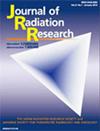富氢溶液通过调节氧化应激和巨噬细胞极化缓解急性放射性肺炎
IF 1.9
4区 医学
Q2 BIOLOGY
引用次数: 0
摘要
本研究旨在探讨富氢溶液(HRS)对大鼠急性放射性肺炎(ARP)的影响。ARP 模型由 X 射线照射诱发。采用 HE 和 Masson 染色法评估组织病理学变化。通过 ELISA 检测炎性细胞因子。免疫组化和流式细胞术用于量化巨噬细胞(CD68)水平和 M2/M1 比率。采用 Western 印迹分析、RT-qPCR、ELISA 和流式细胞术评估线粒体氧化应激损伤指标。免疫荧光双重染色法对 CD68/LC3B 和 p-AMPK-α/CD68 进行共定位。免疫印迹法检测了自噬激活和腺苷-5′-单磷酸激活蛋白激酶/哺乳动物雷帕霉素靶标/Unc-51样激酶1(AMPK/mTOR/ULK1)信号通路相关蛋白的相对表达。ARP可降低大鼠体重,增加肺系数、胶原沉积和巨噬细胞浸润,促进M1极化。经 HRS 治疗后,病理损伤减轻,M1 极化受到抑制。此外,HRS 治疗还逆转了 ARP 引起的线粒体高水平氧化应激损伤和自噬抑制。重要的是,ARP 大鼠的 AMPK-α 磷酸化受到抑制,mTOR 和 ULK1 磷酸化被激活,而 HRS 治疗可逆转这种效应。HRS通过调节AMPK/mTOR/ULK1信号通路,抑制了ARP大鼠的M1极化,缓解了氧化应激,激活了自噬。本文章由计算机程序翻译,如有差异,请以英文原文为准。
Hydrogen-rich solution alleviates acute radiation pneumonitis by regulating oxidative stress and macrophages polarization
This study was aimed to investigate the effect of hydrogen-rich solution (HRS) on acute radiation pneumonitis (ARP) in rats. The ARP model was induced by X-ray irradiation. Histopathological changes were assessed using HE and Masson stains. Inflammatory cytokines were detected by ELISA. Immunohistochemistry and flow cytometry were performed to quantify macrophage (CD68) levels and the M2/M1 ratio. Western blot analysis, RT-qPCR, ELISA and flow cytometry were used to evaluate mitochondrial oxidative stress injury indicators. Immunofluorescence double staining was performed to colocalize CD68/LC3B and p-AMPK-α/CD68. The relative expression of proteins associated with autophagy activation and the adenosine 5′-monophosphate-activated protein kinase/mammalian target of rapamycin/Unc-51-like kinase 1 (AMPK/mTOR/ULK1) signaling pathway were detected by western blotting. ARP decreased body weight, increased the lung coefficient, collagen deposition and macrophage infiltration and promoted M1 polarization in rats. After HRS treatment, pathological damage was alleviated, and M1 polarization was inhibited. Furthermore, HRS treatment reversed the ARP-induced high levels of mitochondrial oxidative stress injury and autophagy inhibition. Importantly, the phosphorylation of AMPK-α was inhibited, the phosphorylation of mTOR and ULK1 was activated in ARP rats and this effect was reversed by HRS treatment. HRS inhibited M1 polarization and alleviated oxidative stress to activate autophagy in ARP rats by regulating the AMPK/mTOR/ULK1 signaling pathway.
求助全文
通过发布文献求助,成功后即可免费获取论文全文。
去求助
来源期刊
CiteScore
3.60
自引率
5.00%
发文量
86
审稿时长
4-8 weeks
期刊介绍:
The Journal of Radiation Research (JRR) is an official journal of The Japanese Radiation Research Society (JRRS), and the Japanese Society for Radiation Oncology (JASTRO).
Since its launch in 1960 as the official journal of the JRRS, the journal has published scientific articles in radiation science in biology, chemistry, physics, epidemiology, and environmental sciences. JRR broadened its scope to include oncology in 2009, when JASTRO partnered with the JRRS to publish the journal.
Articles considered fall into two broad categories:
Oncology & Medicine - including all aspects of research with patients that impacts on the treatment of cancer using radiation. Papers which cover related radiation therapies, radiation dosimetry, and those describing the basis for treatment methods including techniques, are also welcomed. Clinical case reports are not acceptable.
Radiation Research - basic science studies of radiation effects on livings in the area of physics, chemistry, biology, epidemiology and environmental sciences.
Please be advised that JRR does not accept any papers of pure physics or chemistry.
The journal is bimonthly, and is edited and published by the JRR Editorial Committee.

 求助内容:
求助内容: 应助结果提醒方式:
应助结果提醒方式:


